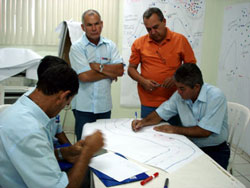Background
on Brazil’s economy
 “Brazil
is doing well, the Brazilian people not yet. The economy is strong,
politics futile, social rights fragile.” These words,
written recently by one of Brazil’s foremost theologians and
social critics, Frei Betto, reflect the frustrations of many, especially
of working people. “Brazil
is doing well, the Brazilian people not yet. The economy is strong,
politics futile, social rights fragile.” These words,
written recently by one of Brazil’s foremost theologians and
social critics, Frei Betto, reflect the frustrations of many, especially
of working people.
Referring to a “macro-economy that today benefits the country
to the detriment of the nation” they indicate a political
economy in which labour’s share of national income has shrunk
from 54 percent in 1990 to 43 percent in 2003, while shares of national
income claimed by the state and especially by private capital have
increased. At the same time productive investment has been mediocre
and financial surpluses continue flowing into debt repayment, financial
speculation and capital flight. The unregistered, “shadow”
economy looms very large - accounting for perhaps 42 percent of
GDP in 2003 - which implies huge costs in lost tax revenues, a weakened
legal and social protection and continuing gross inequality in income,
assets and life-chances, with a powerful negative impact on public
institutions and democracy in general. By contrast, shadow economies
are estimated to account for about 29 percent of GDP in Argentina,
31 percent of GDP in Paraguay.
Such factors reproduce dynamics unfavourable to working people
and to organised labour. Like weak and unstable rates of job creation
in the formal sector and precarious (sub)-employment: in 2003 for
example about 38 percent of economically active Brazilians worked
outside the formal sector, and large proportions (about 20 percent
in São Paulo, 28 percent in Salvador) were wholly unemployed.
There is also a high employment insecurity and labour ‘churning’;
nearly a third of Brazilian workers stay in a job for less than
a year; 55 percent remain for no more than four years.
Consequences of these economic realities are income and time poverty.
In 2003 nearly 60 percent of Brazilians in formal employment earned
no more than twice the legal minimum wage of R$ 272/month (€83).
According to a trade union think-tank, a family of four in 2003
required about R$ 1400 (€490)/month for a basic minimum living
standard. And even though as of 1 April 2006, Brazil’s minimum
monthly wage was set at R$350 (€ 126) - which is much higher
than it used to be - it is still well below the minimum wage (R$
545 in real terms) of 1980. Concerning time poverty: Also in 2003
an estimated 44 percent of workers in São Paulo worked more
than the statutory maximum 44-hour workweek and poor households
tend to mobilise all of their members, including teenage children,
to earn money.
|
